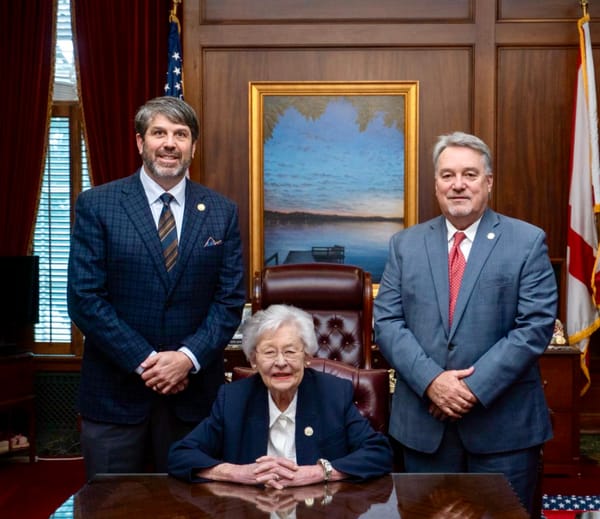10 Commandments Debate Stirs Alabama House
9 Democrats join Republicans to pass bill requiring Commandments be displayed in public schools

A bill requiring the 10 Commandments be displayed in public schools was the subject of extensive debate in the Alabama House on Thursday, April 17th.
HB178 requires each local Board of Education to display the 10 Commandments and certain other documents related to the formation of this nation, subject to the availability of donations. It provides for the use of donations to comply with display requirements, and authorizes the State Board of Education to adopt rules in support of the act.
HB178 was introduced by State Representative Mark Gidley (R-Gadsden) was kind enough to discuss the bill with ALPolitics.com after it passed the House.
“What we're doing here (is) just bringing back one of the foundational documents of our country. There are numerous references from the Founding Fathers to God, and also to the importance of the 10 Commandments. Part of the argument was we're trying to force religion. That is not the case here. We’re simply returning back to one of the foundational, principal guiding documents,” Gidley began.
“Moses holding the 10 Commandments is in the front of our United States Supreme Court building. This is simply an opportunity now to place back what was removed (by the Lemon decision in 1971). This is not forcing religion on anyone. This is not saying that somebody can't be an atheist or an agnostic or any religion. It’s simply stating who we are in our foundational principles and the pillars, if you will, that really formed the mindset and the guidance of our country.
The Lemon test that was part of Thursday’s discussion was the principle that using public funds to advance or impede religion violates the Establishment Clause of the U.S. Constitution. It came from the 1971 Supreme Court case Lemon v Kurtzman, and was overturned in 2022 by Kennedy v Bremerton—the case of High School Coach Joe Kennedy who wanted to silently pray on the field after games.
Rep. Curtis Travis (D-Tuscaloosa) was the first to ride in opposition to HB178, saying, “The issue for me is that we keep trying to put up the 10 Commandments in a manner of display, but it’s not what God, it’s not what Jesus expect us to live by. You know, the law cannot do any good. The law could not save anyone.”
Danny Garrett (R-Trussville) rose in cautious support of the bill: “I firmly believe in freedom of religion expression. I think the pendulum has swung too far. Rather than allow for religious faith to be expressed, we’ve prohibited it. I think that was never the intent of the Founding Fathers. My concern is that legislative mandates are not going to change minds or hearts…I appreciate your intent. I don’t think legislative mandates will drive the result. I believe that we should, in our legislation, focus more on allowing people to freely express their faith in public places.
Rep. Berry Forte (D-Eufala) spoke firmly against HB178: “You remember Roy Moore? We’ve been through this before. I thought the Supreme Court said you couldn’t do that? What’s this going to achieve?”
Rep. Gidley responded by discussing the 1971 Lemon decision by the SCOTUS that has since been overturned, and repeated that the intention of this bill is returning foundational principles to our schools.
Rep. Ernie Yarbrough (R-Trinity) supported the bill, saying, “You look around our nation. You look around the world, and we see much of Western civilization adrift, lost and crumbling because we have forsaken our roots and the foundations on which we were built.”
Rep. Patrick Sellers (D-Pleasant Grove) notably broke ranks with his Democrat colleagues to support HB178.
“Thank you, Rep. Gidley, for this legislation. It’s quite interesting how we debate whether or not these principles should be in, or not, in our schools. Or, should be shared with our children or should not be shared with our children,” Sellers said. “With all that goes on within our society today, what is wrong with these foundational principles? If they were good enough for Israel and the children as God made that covenant with them, so that they could live better and do better—with all that we see within our community and our schools today, we need something.”
“The question I have is: has anyone really read the 10 Commandments?” Sellers continued, before reading the Commandments to the House. “These are principles that our children need, and even if it’s just looking at them on the wall to remind them of what they, and how they, should live from day to day…. That’s not your religion. That’s how you live,” Sellers concluded, leaving the podium to applause from the House.
Rep. Artis “A. J.” McCampbell (D-Demopolis) opposed the bill: “I, like other speakers, agree that we cannot legislate morality. I agree that we need to hold things up for young people, but there’s a place that all of this should begin.”
Rep. Marilyn Lands (D-Huntsville) spoke in opposition, saying “I’m not against the 10 Commandments, but I’m not sure they really were foundational principles of our Founding Fathers, but I know the separation of church and state was. I also know that there are children in our schools from all different sorts of religions. But, I have a question. First of all, which version of the 10 Commandments?”
Rep. Gidley responded that the version listed in the bill was one of the most recognized versions, listed on page six of the bill, and is one of the most commonly used versions. Rep. Lands pointed out there are theee versions, two from Exodus and one from Deuteronomy. Rep. Gidley replied that he’d worked with legislative legal services and the consensus was that the version in the bill was the most commonly used version.
Rep. Lands then questioned whether or not the 10 Commandments were age-appropriate “for some of our littles,” and questioned how many in the House actually keep the 10 Commandments. “I think the 10 Commandments have their place, but I don’t think they need to be in our school,” Lands said.
Rep. Mary Moore (D-Birmingham) was brief in her opposition to HB178, saying, “I just think that it’s wrong to post the 10 Commandments in public places or anywhere, because then we disrespect other people’s faith and their religions. I think the most important thing about the 10 Commandments is to teach it, and then live it.”
Rep. Neil Rafferty (D-Birmingham) described HB178 as “a legal house of cards. It’s impressive until someone opens a window. Our nation’s founding was profoundly influenced by Christian principles and thinker of various denominations…these diverse Christians created a remarkable system of government.” Rafferty went on to cite St. Augustine’s warning that government attempts to enforce religious morality, it harms both the state and religion. Rafferty asked that the unintended consequences of the bill through an Augustinian lens, stating that posting the 10 Commandments would reduce them to a “political football” over their constitutionality.
HB178 passed the House by a vote of 81 AYES to 11 NAYS, with 7 abstentions. It now goes to the Senate.
A total of nine Democrats—Patrick Sellers, Barbara Boyd, Napoleon Bracy, Juandalynn Givan, Lenyatté Hassell, Travis Hendrix, Sam Jones, TaShina Morris and Ontario Tillman—voted in favor of the bill.
Senator Keith Kelly (R-12) is carrying the companion bill, SB166, in the Alabama Senate. SB166 has passed through the Senate Education Policy Committee and is awaiting debate on the Senate floor.
The entire debate can be seen on YouTube on The Alabama Channel HERE at timecode 4:09:15–5:12:30.




